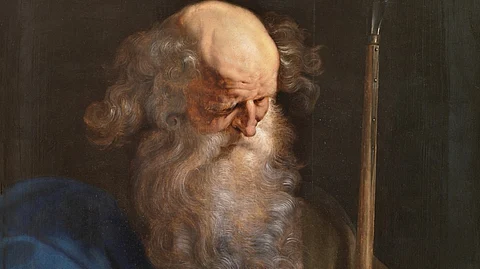
- NEWS
- the EDIT
- COMMENTARY
- BUSINESS
- LIFE
- SHOW
- ACTION
- GLOBAL GOALS
- SNAPS
- DYARYO TIRADA
- MORE

Today's Thoughts to Live by, July 3, Wed,, 13th Week in Ordinary Time, St. Thomas the Apostle:
Readings --
Ephes. 2:19-22;
Ps. 117:1, 2;
Jn. 20:24-29.
1. Some Notes on St. Thomas the Apostle --
His name, Thomas, in Aramaic and Didimus in Greek, means "twin" (name cited in Jn. 11:16). He is also commonly known as "Doubting Thomas." in fact, he did not believe initially in the Resurrection of Christ (see today's Gospel).
2. Thomas was a Jew and was called to be an Apostle of Jesus. His birth and death dates are not certain. He had a passionate love for Jesus. When Jesus wanted to visit the dead Lazarus at a time when the Jews were looking to kill him, Thomas said to his fellow disciples, "Let us also go that we may die with him" (Jn. 11:16). Wanting to know where Jesus was going, he received the profound teaching that Jesus is the Way, the Truth, and the Life (see Jn. 14:1-7).
3. Tradition tells us that St. Thomas went to proclaim the Gospel to the Parthians, Medes, and Persians, and eventually reached India. He travelled as far as Mylapore in South India (modern-day Tamil Nadu) and reached Kerala. The earliest known source that connects the Apostle Thomas to Northwest India was the apocryphal Acts of Thomas, written in Syriac, probably in the early 3rd century. 3rd and 4th century Saints, such as Ambrose of Milan, Gregory of Nazianzus, Jerome, and Ephrem the Syrian, also mention Thomas' trip to India. One story says that he undertook to rebuild a palace for the Indian king but he spent the money for the poor and was imprisoned.
4. St Thomas Christians in Tamil Nadu and Kerala trace their origins to the missionary work of St. Thomas. Some members are in Sri Lanka. They are Eastern Rite Christians with two major branches, the Syro-Malabar Church in communion with Rome and the Syro- Malankara Church, one branch of which is Catholic, while two others are Orthodox and Jacobite. Some are also Anglicans and Evangelicals. The episcopal conferences of both the Syro-Malabar Catholic Church and the Syro-Malankara Catholic Church are members of the Federation of the Asian Bishops Conferences (FABC).
5. The long history of St.Thomas Christians is fraught with divisions, defiance, attempts and failure to reunify. Today, the Syrian Eastern churches remain divided. Their language is Malayalam. Syriac is used for liturgical purposes.
6. St. Thomas was martyred, perhaps in Madras, India, ca. 53 AD. His relics are in the San Thomas Basilica in Chennai, Mylapore, India. Some of his relics were taken to Edessa (in modern Turkey), but were moved in 1258 and are now in the Cathedral of St. Thomas, the Apostle in Ortona, Italy. A legend says that, of all the Apostles, Thomas was privileged to see Mary's Assumption into heaven. He is depicted with a spear and ruler. The ruler refers to his work as a builder and the spear to his martyrdom.
7. 1st Reading, Ephes. 2:19-22 -- In Chapter 2, St. Paul instructs the believers in Ephesus on the countless blessings from the Risen Christ: salvation and life with Christ, peace and union of gentiles and Jews as one community of believers, and access to the Holy Spirit (vv. 1-18). You (Ephesians) are now "fellow citizens with the holy ones and members of the household of God, built upon the foundation of the apostles and prophets, with Christ as the capstone" (vv. 19-20). Through Christ, you are held together and grow into a sacred temple of the Lord, a dwelling place of God in the Spirit (vv. 21-
22).
8. Responsorial Ps. 117:1, 2 -- With only 2 verses, this psalm of praise is the shortest of all the 150 Psalms. "Praise the Lord, all you nations! Extol him, all you peoples! His mercy for us is strong, the faithfulness of the Lord is forever. Hallelujah!"
9. Gospel, Jn. 20:24-29 -- The
Apostles tell Thomas that Jesus has risen. But Thomas says, "Unless I see the
the mark of the nails in his hands and put my finger into the nailmarks and put my hand into his side, I will not believe" (vv. 24- 25). A week later, Jesus reappears to them, with Thomas present. Jesus says to Thomas, "Put your fingers here and see my hands, and bring your hand and put it into my side, and do not be unbelieving, but believe" (v. 27). Thomas answers, "My Lord and my God!" (v. 28). Jesus says to him, "Blessed are those who have not seen and have believed" (v. 29). This verse is a beatitude to us, who have not seen Jesus in his lifetime, and yet believe. In the Creed, we declare, "I believe in the Lord Jesus Christ."
10. Prayer -- Almighty and ever living God, may we glory in the Feast of the blessed Apostle Thomas. He acknowledged Jesus, your Son, as the Lord. Grant, we pray, that we may always be sustained by his intercession and, believing, may have eternal life with you. This we pray, through Christ, our Lord. Amen.
Prayers, best wishes, God bless!
